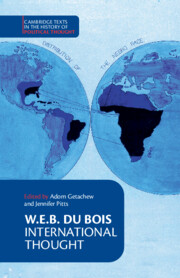Book contents
- W.E.B. Du Bois: International Thought
- Cambridge Texts In The History Of Political Thought
- W.E.B. Du Bois: International Thought
- Copyright page
- Contents
- Figures
- Acknowledgments
- Note on the Text
- Democracy and Empire
- Select Chronology of William Edward Burghardt Du Bois
- Book part
- 1 The Present Outlook for the Dark Races of Mankind (1900)
- 2 To the Nations of the World (1900)
- 3 The African Roots of War (1915)
- 4 Of the Culture of White Folk (1917)
- 5 Letter from W. E. B. Du Bois to President Woodrow Wilson (1918)
- 6 To the World (Manifesto of the Second Pan-African Congress) (1921)
- 7 Worlds of Color (1925)
- 8 Liberia and Rubber (1925)
- 9 Liberia, the League and the United States (1933)
- 10 Where Do We Go from Here?
- 11 Inter-Racial Implications of the Ethiopian Crisis: A Negro View (1935)
- 12 The Clash of Colour: Indians and American Negroes (1936)
- 13 The Union of Colour (1936)
- 14 What Japan Has Done (1937)
- 15 Black Africa Tomorrow (1938)
- 16 The Realities in Africa: European Profit or Negro Development? (1943)
- 17 Prospect of a World without Race Conflict (1944)
- 18 Colonies and Moral Responsibility (1946)
- 19 A Cup of Cocoa and Chocolate Drops (1946)
- 20 An Appeal to the World: A Statement of Denial of Human Rights to Minorities
- 21 Colonies as Cause of War: Address to the World Peace Congress, Paris (1949)
- 22 On the West Indies: Address of Dr. W. E. B. Du Bois at the St. Thomas Chamber of Commerce (1952)
- 23 To the World Peace Council, Budapest (1953)
- 24 Colonialism and the Russian Revolution (1956)
- Index
19 - A Cup of Cocoa and Chocolate Drops (1946)
Published online by Cambridge University Press: 10 November 2022
- W.E.B. Du Bois: International Thought
- Cambridge Texts In The History Of Political Thought
- W.E.B. Du Bois: International Thought
- Copyright page
- Contents
- Figures
- Acknowledgments
- Note on the Text
- Democracy and Empire
- Select Chronology of William Edward Burghardt Du Bois
- Book part
- 1 The Present Outlook for the Dark Races of Mankind (1900)
- 2 To the Nations of the World (1900)
- 3 The African Roots of War (1915)
- 4 Of the Culture of White Folk (1917)
- 5 Letter from W. E. B. Du Bois to President Woodrow Wilson (1918)
- 6 To the World (Manifesto of the Second Pan-African Congress) (1921)
- 7 Worlds of Color (1925)
- 8 Liberia and Rubber (1925)
- 9 Liberia, the League and the United States (1933)
- 10 Where Do We Go from Here?
- 11 Inter-Racial Implications of the Ethiopian Crisis: A Negro View (1935)
- 12 The Clash of Colour: Indians and American Negroes (1936)
- 13 The Union of Colour (1936)
- 14 What Japan Has Done (1937)
- 15 Black Africa Tomorrow (1938)
- 16 The Realities in Africa: European Profit or Negro Development? (1943)
- 17 Prospect of a World without Race Conflict (1944)
- 18 Colonies and Moral Responsibility (1946)
- 19 A Cup of Cocoa and Chocolate Drops (1946)
- 20 An Appeal to the World: A Statement of Denial of Human Rights to Minorities
- 21 Colonies as Cause of War: Address to the World Peace Congress, Paris (1949)
- 22 On the West Indies: Address of Dr. W. E. B. Du Bois at the St. Thomas Chamber of Commerce (1952)
- 23 To the World Peace Council, Budapest (1953)
- 24 Colonialism and the Russian Revolution (1956)
- Index
Summary
This unpublished essay of 1946 examines the West African cocoa industry as a case study of the attempt by African agricultural producers to resist exploitation by European capital. On the Gold Coast, native farmers developed robust cocoa production without European investment or other assistance; if they were white, they would soon have become a prosperous community of independent peasant farmers, begun processing raw material, and eventually achieved Dominion political status. Because they were Black they faced unhindered exploitation, refusals to give them voice in industry or the state, and ignorance and betrayal on the part of British officials. Merchant cartels monopolized the market and suppressed the price paid for raw cocoa, farmers were prevented from hedging against fluctuations on the world market by storing their crop, and they were driven into ruinous loans by moneylenders. The farmers’ early success in boycotting the cocoa market was disrupted by the advent of World War II, when the British government established a government monopoly and fixed cocoa prices. The cocoa farmers’ self-organization should be recognized as a model for the emancipation of colonial populations.
Keywords
- Type
- Chapter
- Information
- W. E. B. Du Bois: International Thought , pp. 215 - 228Publisher: Cambridge University PressPrint publication year: 2022

